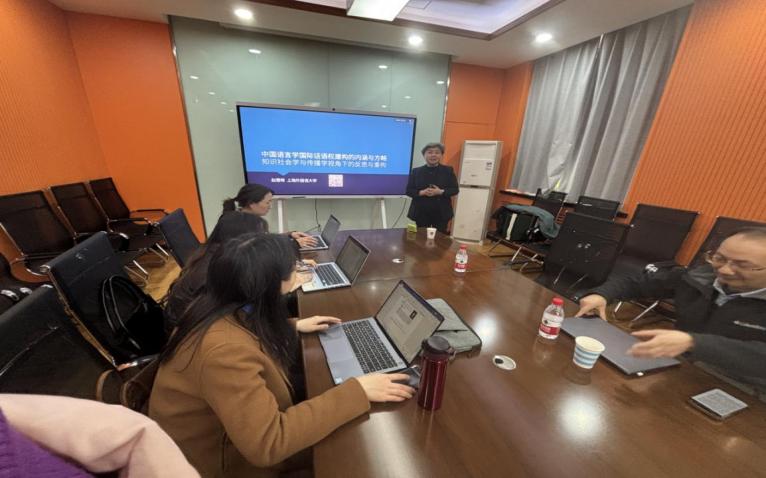On the morning of March 14, the Center for Foreign Language Education and Teacher Development at the School of Foreign Studies (SFS) at Nankai University, in collaboration with the Center for Linguistic Studies, the Virtual Teaching and Research Office for Integrated Teaching and Research in Foreign Language Education, and the Foreign Language Curriculum Studies Committee of the China Association for Comparative Studies of English and Chinese, invited Prof. Zhao Ronghui from Shanghai International Studies University to deliver a lecture titled “Connotations and Strategies for Constructing China’s International Discursive Power in Linguistics.”
The lecture was organized and chaired by Prof. Zhang Wenzhong, doctoral supervisor at the SFS at Nankai University and Director of the Center for Foreign Language Education and Teacher Development. Nearly twenty faculty members and doctoral candidates from the Departments of English, Japanese, Russian, French, and Foreign Languages for Non-Majors attended the event.
Prof. Zhao Ronghui, a doctoral supervisor at Shanghai International Studies University and chief expert of a Major Project for Key Research in Philosophy and Social Sciences under the Ministry of Education, currently serves as Executive Director of China Center for Foreign Language Strategic Studies —a National Language Commission Research Base and National Language Policy Think Tank — as well as Director of the National Innovation Base for “Language Policy and Language Education Studies,” and Director of the Center for Applied Linguistics at the Institute of Linguistic Sciences in Shanghai International Studies University. Her research areas cover sociolinguistics, language policy and language education, and the history of language and linguistics. She advocates “observing languages through the world, and observing the world through languages.”

In the lecture, drawing upon perspectives from both the sociology of knowledge and communication studies, Prof. Zhao systematically deconstructed the theoretical connotations of international discursive power and identified three major issues in current studies on the construction of China’s international discursive power in linguistics. They were caused by definition, evaluative dimensions and pathways, and disciplinary classification of discursive power. For instance, some studies put Chinese linguistics into the binary positioning (“China vs. the West”), leading to the narrowing of evaluative paths by only considering English-language outputs while neglecting diversity within the so-called “West.”
At the theoretical level, she argued that the academic world constitutes a trans-temporal and trans-spatial community of knowledge and that academic discursive power essentially denotes influence — that is, the communicative effectiveness of knowledge within that community; the essence of academic discursive power lies in the power struggle among knowledge communities, the core of which is the efficacy of knowledge transmission across time and space.
According to Prof. Zhao, achieving international discursive power in Chinese linguistics depends on four elements — trust, attractiveness, dependence, and serviceability. Trust and attractiveness may be enhanced by widening the scope through which global languages are examined; dependence may be increased by improving the informational richness and quality of scholarly work; and serviceability may be reinforced through deeper engagement that enables Chinese linguistics to influence international language life. Anchored in the connotations of discursive power and guided by comparative quantitative indicators, the lecture identified existing gaps in China’s efforts in this domain and put forward strategic directions for advancing the international discursive power of Chinese linguistics.



